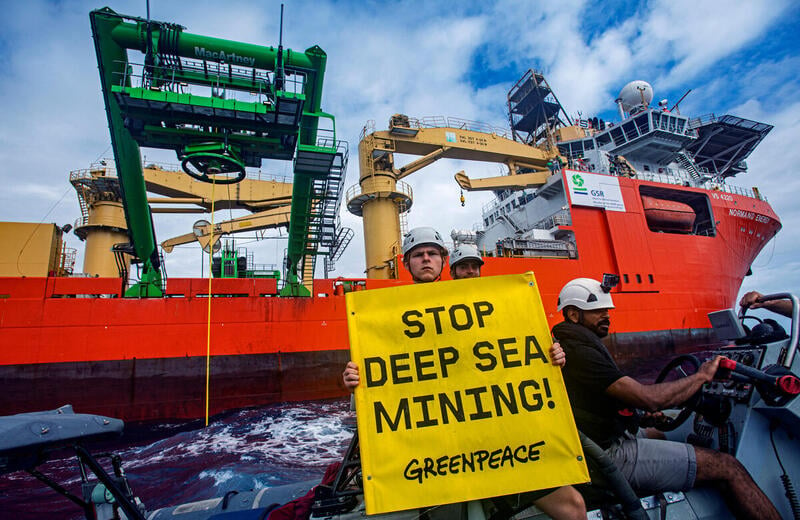
A Humpback whale breaches off a reef in the Southern Great Barrier reef on its Southern Migration, Queensland, Australia.
If we save the ocean, she may just save us all.
We depend on the world’s oceans for our very survival. In addition to providing food for millions of people, they contain 50 to 80 percent of all life on this planet. Oceans help regulate the world’s climate and weather, contain 97% of our water, produce more than half of all oxygen and absorb a high volume of carbon dioxide. For these and other reasons, protecting them is critical to our survival.
But, for most of our history, we treated the ocean as if it was too big to fail. We have removed 90% of the large fish, and caused enormous damage to fragile seafloor habitats with fishing gear. Many seafood businesses now exploit workers to cut costs as fish become harder to find.
Our reliance on coal, oil, and natural gas has heated and acidified the ocean to the point where coral reefs are dying off and the ice caps are melting. And so much plastic has flowed into the ocean that we now see plastic everywhere we look – from once pristine beaches to the depths of the Mariana Trench. To add insult to injury, corporations like Deep Green are planning to begin large scale mining of the deep sea. Given that 80% of the ocean remains unexplored, it’s impossible to comprehend all that would be lost should companies start blindly ravaging the ocean floor.

Greenpeace Italy carries out monitoring and documentation of the state of health of the sea by diving into the depths rich in biodiversity.
We are finally realizing our mistakes. Solving them is not complicated, but it requires courage and willpower. We need to:
- Move away from fossil fuels and invest in renewable energy sources like solar and wind.
- Establish a network of sanctuaries to rebuild depleted populations and give ocean ecosystems a fighting chance to withstand the stresses of climate change, plastic pollution, industrial fishing, and acidification.
- Manage fisheries for true sustainability – set and enforce precautionary catch limits, and phase out destructive fishing methods. End human rights abuse in the seafood supply chain and force seafood businesses to treat workers fairly.
- Eliminate single-use plastic, and move to reuse, refill, and package-free designs.
- Stop deep sea mining before it can gain a foothold.

Greenpeace International activists from the Rainbow Warrior attach a flag reading ‘Stop Deep Sea Mining” to the cable holding the prototype robot, Patania II.
These are global problems, with global solutions.
Our government has a key role to play, as does the United Nations. A new global ocean treaty is being negotiated this year, and if we get it right it will enable us to scale up sanctuaries for the first time. In February, 2022, the UN will decide whether to begin work on a treaty to eliminate plastic pollution. Together, the global ocean treaty and a treaty to eliminate plastic pollution can provide the baseline protections the oceans need to have a chance at rebounding from centuries of human exploitation.
There is also considerable opportunity to make real progress at the state and national level. Bills to end exports of plastic waste to the global south, tax plastic producers, and stop companies from using false recyclability claims are in play, as are several state efforts to force polluters to take responsibility for the full life cycle of their products and packaging.
And organizations like Greenpeace, with resources like our fleet of ships and a history of working with scientists and researchers, can continue to explore previously hidden areas of our ocean, bringing to light new information and revelations. From previously unknown species to natural formations that defy known science, there is an entire universe waiting to be discovered.
The solutions and opportunities are as big as the problems themselves, but each of us can play an important role in making them a reality. Our power comes when we stand together and demand politicians and corporate executives to give us better choices – options that are healthier for our communities and the ocean. We must hold the corporations that are harming our ocean accountable, and ensure that they become part of the solution. We must continue to remain curious about the unknown.
The ocean is depending on us.
—
This essay is part of our Perspectives: Our Next Fifty Years series, in which we reflect briefly on our first fifty years, but more importantly, we lay out the future we are building together—collaborative, ambitious, and intersectional. The work ahead won’t be easy, but we’ve never shied away from hard work. We continue to push for policies that recognize the contributions and leadership of marginalized groups, and we amplify their voices, looking to their wisdom to show us the way. We hold corporations accountable, demanding real action that puts people ahead of profit. We work each day with our partners to co-create green, safe planet for all beings. We recognize that equality is not necessarily justice. We demand more from our leaders, from our colleagues, and from ourselves. A green and peaceful world isn’t just a slogan—it is our mission, and it takes each one of us to get there.

